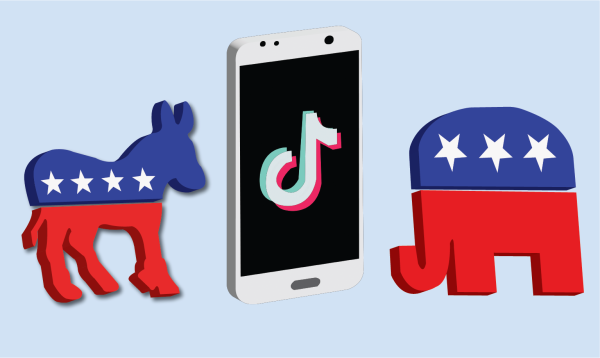
TikTok has taken the world by storm and proven itself to be a versatile and widely embraced platform. While various industries have used the platform for exposure, TikTok has specifically become a critical tool used for political engagement.
Political campaigns have recognized the potential influence that TikTok can have over young voters. Around 60% of TikTok’s over 150 million American users are Gen Z, an age group of people born in the late 1990s to early 2010s notoriously difficult for politicians to connect with.
The primary goal of mobilizing this crucial voter base has inspired both candidates and incumbents to share their political agendas on the platform. TikTok allows politicians to adopt a more personal and authentic approach.
It encourages them to showcase their human side, providing glimpses into their everyday lives, values and interests. Jamaal Bowen, a representative from New York, used the app to crack jokes at Rep. Kevin McCarthy’s attempts to be elected the next speaker of the House. Others have taken to dancing to the latest viral trends, fostering transparency and relatability that resonate with young voters seeking authenticity in their political representatives.
Often, users dub sounds over videos of politicians to make comedy videos that can appeal to younger demographics.
@goat.1019 Quality #donaldtrump #trump #dance #😂😂 #fyp #foryou ♬ YMCA – Village People
TikTok has successfully bridged the gap between politicians and young voters, as was seen in the 2022 midterm elections. The 2022 midterms had the second-highest youth voter turnout in 30 years, with around 27% of total voters aged 18 to 29. This notable surge in youth voter participation has been attributed to the platform’s influence. This achievement demonstrates the platform’s potential to be a powerful tool for political campaigns by mobilizing a crucial voter demographic. Although TikTok has the potential to be a positive tool for politics, some negatives have emerged from the platform.
TikTok significantly influences the political polarization of young people. The platform’s algorithm tailors content to individual users based on their viewing habits and content engagement. The algorithm does not merely factor in likes and follows when determining a user’s content feed; it also considers the frequency with which a video is watched and how quickly content is scrolled past. While this personal customization is harmless when the platform is solely being used for entertainment purposes, it becomes concerning within a political context.
TikTok’s algorithm has the potential to create echo chambers, a phenomenon where users are exposed primarily to content that aligns with their existing beliefs, preferences and associated hashtags. This filtering effect can limit exposure to diverse viewpoints and result in a biased, one-sided narrative. Echo chambers make users less likely to consider alternative opinions and may contribute to the spread of misinformation. When users are consistently presented with content that aligns perfectly with their existing views, it reinforces their beliefs, potentially pushing them towards more extreme positions on either side of the political spectrum. While this may not seem pressing now, it can result in more extremist politicians — with more extremist supporters — being elected in the future.
TikTok’s growing influence and popularity have not come without significant controversy and concerns, particularly in the realm of national security. These concerns have become so pronounced that Congress has taken steps to impose a ban on the app’s usage on all government devices, citing potential risks to the nation’s security infrastructure. This could have profound impacts on future election cycles, specifically the upcoming 2024 presidential election.
Many campaigns have wholly embraced TikTok as one of their primary tools for recruiting potential voters, something that is heavily challenged by talks of a potential ban for the entire country. The loss of TikTok as a campaign tool would necessitate a significant shift in campaign strategies, as it would force politicians to find alternative means of connecting with younger voters.
While the future of TikTok remains uncertain, one thing is evident: TikTok has undeniably made a profound impact on both our society and the political landscape. It has reshaped the way politicians engage with their constituents and connect with younger voters, leaving an indelible mark on the intersection of technology, politics and communication.